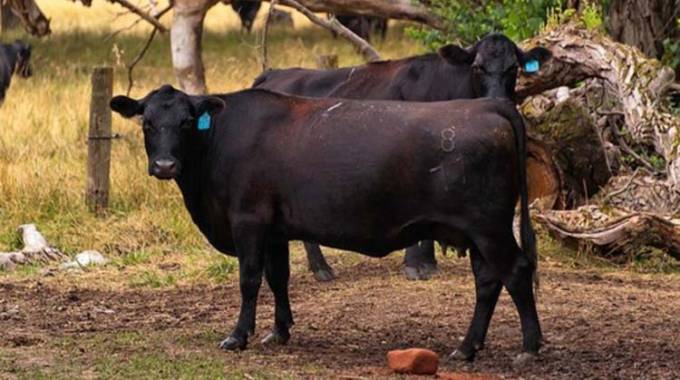
The ManicaPost

Samuel Kadungure
Senior Reporter
A truck carrying 14 cattle infected with theileriosis, a tick-borne disease famously known as January disease and destined for slaughter was intercepted by the police in Mayo, Makoni District, and are currently under quarantine as they get treatment.
The cattle were mobilised around Mayo and destined for an abattoir in Shamva.
The illegal movement of cattle without veterinary permits and police clearance is blamed for fuelling animal diseases in the country.
This is impoverishing the majority of small-holder farmers who derive their livelihoods from their livestock.
The Department of Veterinary Services has raised concern over illegal movement and the slaughtering of cattle infected with January disease for human consumption.
Unscrupulous butcheries are allegedly circumventing health protocols to make a quick buck by buying and slaughtering cattle infected with theileriosis and selling the meat at the expense of public health.
Hundreds of cattle are succumbing to a recent outbreak of the deadly disease, resulting in some farmers selling their infected cattle to butchers for a song.
Manicaland Department of Veterinary Services’ provincial epidemiologist, Dr Innocent Chabanga said the owners of the impounded cattle – Christopher Nyamuronda, of Village 13 Mayo (two beasts); Fredrick Kabasa, of Village 36, Mayo, (four beasts); Innocent Mukombero of Village 12, Mayo (three beasts); Ngoni Zimbudzi of Village 38 Mayo (four beasts) and the truck driver, Blessing Tigere of Village 18 Nyamuzizi, Mutoko (one beast) were arrested and fined US$30 per each beast.
Dr Chabanga said the cattle are quarantined at Mayo for the next 28 days and are undergoing treatment.
“The owners were fined US$30 per cattle for illegal movement, and the cattle were not destroyed, but are under quarantine as they undergo treatment.
“One of the options enshrined in the Animal Health Act (Chapter 19:01) is to quarantine, treat, test or order their further quarantine.
“This is what we are doing in this case, because the option to kill and dispose of the animal is normally taken when cattle are coming from a foot and mouth zone,” said Dr Chabanga.
Foot and mouth is a severe, highly contagious viral livestock disease that has a significant economic impact as it affects cattle, swine, sheep, goats and other cloven-hoofed ruminants.
It is a transboundary animal disease that deeply affects the production of livestock and can disrupt regional and international trade in animals and animal products.
If left unchecked, the disease can cripple the livestock sector, cause immense animal suffering, destroy farmer businesses, create food insecurity and impact trade for the country.
“The police intercepted a truck ferrying 14 cattle in Makoni District after discovering that the cattle had no veterinary movement permits and police clearance. The cattle were sick and on the first day, six cattle died and more continued to die,” said Dr Chabanga.
“When we did post-mortem of the carcasses, we discovered that they were infected with the January disease. We are worried that movement of cattle infected by January disease will further increase the spread of the disease to many places. We discovered that these cattle were destined for an abattoir for slaughter. The meat was going to be sold to the public for consumption.
“If people eat such animals they are consuming unclean meat.
“There is a concept known as anti-microbial resistance that can develop when people consume cattle that have been administered with antibiotics.
“Anti-microbial resistance mean that when people fall sick, they will not be able to respond positively to drugs. The abattoirs that are not taking correct procedures in buying cattle are compromising public health,” said Dr Chabanga.
Provincial Veterinary Officer, Dr Charles Guri added his voice in condemning unscrupulous dealers who buy and slaughter infected meat at the expense of public health.
Authorities have since ordered all butcheries to stop the practise and the police, veterinary and health experts are now investigating to establish the extent of matter.
Dr Guri said it is illegal and unethical for butcheries and abattoirs to slaughter diseased animals and sale the meat to the public.
He said cattle whose meat is meant for commercial purposes must be slaughtered at a registered abattoir where compulsory meat inspection is done.
Apart from January Disease, the province has also experienced an outbreak of anthrax that is now under control.
Meanwhile, the case in which a Headlands safari operator who allegedly moved an uninspected buffalo from a game park in Goromonzi was on Wednesday withdrawn at the Rusape Magistrates’ Court.
The safari proprietor, Mr Kudakwashe Mucharambeyi had approached the court seeking an urgent order to interdict the Department of Veterinary Services from killing and disposing the animal.
On two occasions, the Department of Veterinary Services tried to kill the animal, arguing that its movement without a veterinary movement permit posed serious danger to animal health in the province since a buffalo is carrier of foot and mouth disease and buffalo-derived theileriosis.
The buffalo was moved from Bushman Rock Safaris, Goromonzi, to Eco Nyati Game Park in Headlands.



